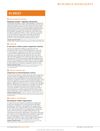 April 2024 in “Pharmaceuticals”
April 2024 in “Pharmaceuticals” Bimatoprost helps with hair growth and eye conditions but can be costly and have side effects.
April 2024 in “International journal of molecular sciences” Light-based treatment, Photobiomodulation, shows promise for non-invasive skin therapy with few side effects.
 October 2023 in “BMC endocrine disorders”
October 2023 in “BMC endocrine disorders” A pineal tumor caused a boy's early puberty, which changed from peripheral to central after treatment.
 August 2013 in “Nature Reviews Drug Discovery”
August 2013 in “Nature Reviews Drug Discovery” New treatments may restore cancer-blocking proteins, slow prostate cancer, identify drug targets, and potentially regrow hair.
 310 citations,
November 2011 in “Environment International”
310 citations,
November 2011 in “Environment International” Anticancer drugs are increasingly found in surface waters, and their long-term environmental effects are not well understood, requiring better testing methods.
 22 citations,
July 2014 in “Hormones”
22 citations,
July 2014 in “Hormones” Metformin may help treat neuroendocrine tumors.
 1 citations,
January 2020 in “Research Square (Research Square)”
1 citations,
January 2020 in “Research Square (Research Square)” Banana (Musa × paradisiaca) may help fight cervical cancer and skin cancer.
26 citations,
February 2015 in “Pediatric blood & cancer” Targeted anticancer therapies in children often cause skin side effects like rash and dry skin.
 9 citations,
January 2014 in “Annals of Dermatology”
9 citations,
January 2014 in “Annals of Dermatology” Some breast cancer patients on hormonal therapy may develop male or female pattern hair loss, which can sometimes be improved with topical treatments.
 44 citations,
September 2015 in “Annals of Oncology”
44 citations,
September 2015 in “Annals of Oncology” Targeted cancer therapies have a significant but lower risk of causing hair loss compared to chemotherapy.
Lablab purpureus peptides may effectively kill cancer cells with fewer side effects.

Some cancer treatments cause different types of hair loss, but scalp cooling can help prevent it.
 18 citations,
May 2013 in “Cutaneous and Ocular Toxicology”
18 citations,
May 2013 in “Cutaneous and Ocular Toxicology” The cancer drugs bortezomib and lenalidomide cause skin side effects in many patients.
32 citations,
May 2018 in “Journal of the American Academy of Dermatology” Skin reactions from cancer treatments might predict how well the treatments work.
4 citations,
February 2019 in “Breast Cancer Research and Treatment” DHL-HisZnNa may help reduce hair loss from chemotherapy, but more research is needed.
December 2022 in “Journal of The American Academy of Dermatology” Low-dose oral minoxidil combined with topical minoxidil improves hair growth in breast cancer patients with therapy-induced hair loss.
65 citations,
October 2015 in “Acta Biomaterialia” The nano-carrier makes etoposide safer and more effective against lung cancer.
 December 2021 in “Asia-Pacific journal of pharmacotherapy & toxicology”
December 2021 in “Asia-Pacific journal of pharmacotherapy & toxicology” Banana plant leaves extract may have cancer-fighting and antioxidant properties.
 11 citations,
October 2019 in “Cancers”
11 citations,
October 2019 in “Cancers” Spironolactone may make some cancer treatments more effective by blocking a protein that helps cancer cells survive.
27 citations,
April 2021 in “Phytotherapy Research” Curcumin may be an effective and safer anticancer agent by regulating key cell pathways.
 52 citations,
October 2016 in “Clinics in Dermatology”
52 citations,
October 2016 in “Clinics in Dermatology” Some medications can cause acne, and stopping these drugs is the main treatment.
 3 citations,
November 2022 in “Experimental dermatology”
3 citations,
November 2022 in “Experimental dermatology” Melatonin may inhibit melanoma growth and has potential as a cancer therapy aid, but its effects on human skin pigmentation need more research.
 1 citations,
July 2022 in “Pakistan biomedical journal”
1 citations,
July 2022 in “Pakistan biomedical journal” Transethosomes improve drug delivery through the skin by overcoming the outer skin layer's barrier.
 1 citations,
January 2018 in “Springer eBooks”
1 citations,
January 2018 in “Springer eBooks” The document concludes that scalp cooling and treatments like minoxidil can help manage hair loss from cancer therapy.
April 2023 in “Journal of Investigative Dermatology” Aminoacridine and Abemaciclib, especially combined with Minoxidil, show promise for treating hair loss.
1 citations,
January 2023 in “IntechOpen eBooks” Paclitaxel is an effective cancer drug with side effects and potential new uses beyond cancer.
 January 2023 in “Discovery medicine”
January 2023 in “Discovery medicine” Cepharanthine helps reduce cell aging caused by the cancer drug Doxorubicin by boosting cell cleanup processes.
 16 citations,
February 2019 in “Pediatric Blood & Cancer”
16 citations,
February 2019 in “Pediatric Blood & Cancer” Most children with CNS tumors on targeted therapy had skin reactions, which were generally treatable without stopping the therapy.
 March 2005 in “Inpharma Weekly”
March 2005 in “Inpharma Weekly” China approved Sinovac's flu vaccine, Japan approved RiUP for female hair loss, and Nippon Kayaku's three cancer drugs.
 155 citations,
March 2009 in “Seminars in Cutaneous Medicine and Surgery”
155 citations,
March 2009 in “Seminars in Cutaneous Medicine and Surgery” Scalp cooling might reduce hair loss from chemotherapy, but evidence is weak and other treatments are being tested.




















